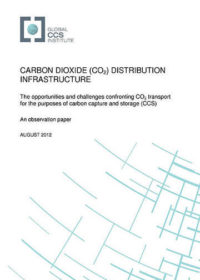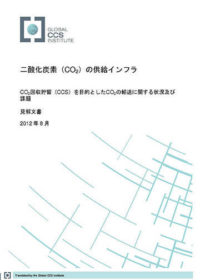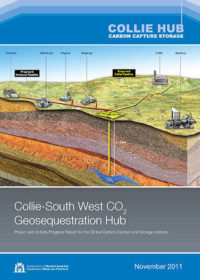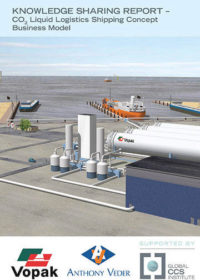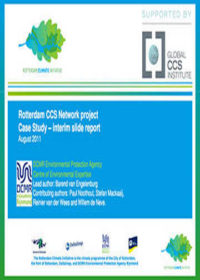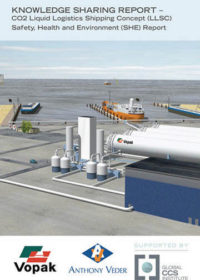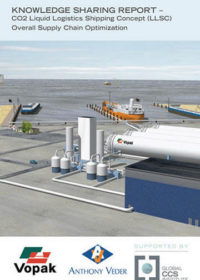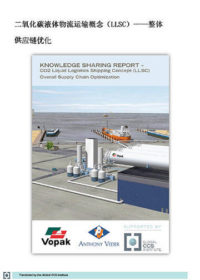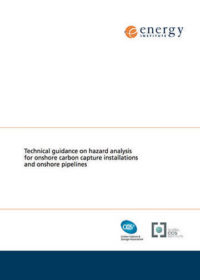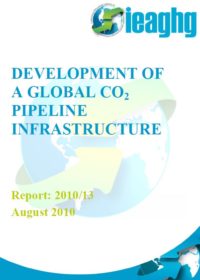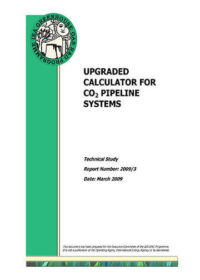Resources
Publications
Our publications, reports and research library hosts over 500 specialist reports and research papers on all topics associated with CCS.
View our Publication Library Disclaimer.
Filter by
Carbon dioxide (CO2) distribution infrastructure
23rd August 2012
Topic(s): Carbon capture use and storage (CCUS), CO2 hubs, CO2 transport
Disclaimer
The content within the Global CCS Institute Publications, Reports and Research Library is provided for information purposes only. We make every effort and take reasonable care to keep the content of this section up-to-date and error-free. However, we make no claim as to its accuracy, currency or reliability.
Content and material featured within this section of our website includes reports and research published by third parties. The content and material may include opinions and recommendations of third parties that do not reflect those held by the Global CCS Institute.
二酸化炭素(CO2)の供給インフラCO2回収貯留(CCS)を目的としたCO2の輸送に関する状況及び課題見解文書
1st August 2012
Topic(s): Carbon capture use and storage (CCUS), CO2 hubs, CO2 transport
本文書は、CO2回収貯留(CCS: Carbon Capture and Storage)に利用されるCO2(二酸化炭素)の供給インフラ(ネットワーク)に関して、公的に入手可能である査読付き研究論文からいくつかを選択し、専門知識がなくとも理解できる要約として提供することを目的とする。
本文書は、主にパイプラインによるCO2の輸送に注目する。公的に入手可能な文献のほとんどによれば、今後数十年のうちに回収及び貯留しなければならないと考えられる数十億トンのCO2の大半を輸送する手法でもっとも有力なものはパイプラインである。気候変動が危険な水準に至ることを回避しうるCO2収支(温室効果ガスの許容排出量)を維持するという国際社会の流れの中で、この規模の緩和措置は必要不可欠であると考えられている。
本文書では、CO2の回収及び貯留の手法については特に言及していない。しかし、十分かつ確実なCO2の排出源はもとより、十分かつ厳重で、安全に利用できる長期的な貯留方法がない限り、CO2が相当規模にて輸送されることはないと認識している。したがって、こうした活動には、所有権、長期的な義務に関する適切な規制、サイトの監視・測定・検証(MMV:monitoring, measurement and verification)及びCCSチェーン全体における効果的なコンプライアンス制度の確立が今後必要になるであろう。
Disclaimer
The content within the Global CCS Institute Publications, Reports and Research Library is provided for information purposes only. We make every effort and take reasonable care to keep the content of this section up-to-date and error-free. However, we make no claim as to its accuracy, currency or reliability.
Content and material featured within this section of our website includes reports and research published by third parties. The content and material may include opinions and recommendations of third parties that do not reflect those held by the Global CCS Institute.
Collie-South West CO2 Geosequestration Hub: project and activity progress report for the Global Carbon Capture and Storage Institute
23rd November 2011
Topic(s): Carbon capture use and storage (CCUS), CO2 hubs, CO2 storage
The South West CO2 Geosequestration Hub project is a government-industry partnership presently led by the Western Australian Department of Mines and Petroleum. The South West Hub project was established to examine the options for CCS in the South West of Western Australia (a major industrial region and a significant CO2 producer). In November 2011, the South West Hub project was shortlisted as one of the Australian CCS National Flagship Projects and in June 2011 was awarded AU$52 million under that Program for its ongoing project development.
This first Project and Activity Progress report prepared for the Global CCS Institute describes the project’s history, current status, and future program. Furthermore, it highlights key legislative interactions, public communication activities, as well as the challenges and risks the project is currently facing. Future progress reports, anticipated at six-monthly intervals will build on key themes noted in this first report. From time to time additional Special Reports on specific subjects considered important for the development of the South West Hub project will also be made available on the Institute’s knowledge platform.
Disclaimer
The content within the Global CCS Institute Publications, Reports and Research Library is provided for information purposes only. We make every effort and take reasonable care to keep the content of this section up-to-date and error-free. However, we make no claim as to its accuracy, currency or reliability.
Content and material featured within this section of our website includes reports and research published by third parties. The content and material may include opinions and recommendations of third parties that do not reflect those held by the Global CCS Institute.
Knowledge sharing report. CO2 liquid logistics shipping concept: business model
18th November 2011
Topic(s): Carbon capture use and storage (CCUS), CO2 hubs, CO2 transport
With the different CCS logistical chain components identified and the high number of emitters in the Rotterdam area, the companies Vopak, Anthony Veder, Air Liquide and Gasunie joined forces in a joint venture called Carbon In Transport (De Rotterdamse CINTRA Maatschappij BV, or CINTRA) to provide a fully-integrated CCS transportation solution – for both emitters and storage providers.
To support the early deployment of CCS in Rotterdam and the development of a Rotterdam CCS Network, the Global CCS Institute supported Vopak and Anthony Veder to conduct a feasibility study on their CO2 liquid logistics shipping concept that will provide emitters with a complete logistical transportation solution for captured CO2 from their site to an offshore storage location.
In this report business principles for the liquid logistics shipping concept are elaborated upon and a rationale on how this business model can be rolled out further is provided. In addition, the transportation costs for the various shipping and pipeline routes are compared.
Disclaimer
The content within the Global CCS Institute Publications, Reports and Research Library is provided for information purposes only. We make every effort and take reasonable care to keep the content of this section up-to-date and error-free. However, we make no claim as to its accuracy, currency or reliability.
Content and material featured within this section of our website includes reports and research published by third parties. The content and material may include opinions and recommendations of third parties that do not reflect those held by the Global CCS Institute.
Rotterdam CCS Network Project. Case study: interim slide report
1st August 2011
Topic(s): Carbon capture use and storage (CCUS), CO2 hubs, Public engagement
This slide report presents the interim results of the case study conducted to make explicit the history and lessons learnt of the Rotterdam CCS Network Project.
The Rotterdam Climate Initiative (RCI) is in the process of realising CCS in the Rotterdam area, the Netherlands. CCS activities in Rotterdam commenced in 2006 and until now, more than 20 companies cooperated to provide feasibility level engineering studies for CO2 capture projects and a CCS common infrastructure network. The Rotterdam CCS Network Project can be characterised by:
- a broad cooperation between parties, with active commitment of industrial organisations;
- a vision that transcends single-source-single-sink projects and aims at a network, a hub function and focuses on the whole CCS chain of CCS; encompassing technology and organisational, legal and financial issues; and
- a local (political) commitment to a long term approach towards CCS deployment which transcends the region of Rotterdam.
The Rotterdam CCS Network project has experiences in a large number of fields that are considered highly relevant to other CCS projects: i.e. use of goals and means; internal organisation; cooperation with industry, authorities and other stakeholders; technical, financial, legal and communication aspects; and lobbying.
Together the RCI and the Institute phrased the following two objectives for a case study: discover the lessons learnt from Rotterdam useful for the support of CCS projects around the globe; and improvement of the Rotterdam CCS project itself.
Disclaimer
The content within the Global CCS Institute Publications, Reports and Research Library is provided for information purposes only. We make every effort and take reasonable care to keep the content of this section up-to-date and error-free. However, we make no claim as to its accuracy, currency or reliability.
Content and material featured within this section of our website includes reports and research published by third parties. The content and material may include opinions and recommendations of third parties that do not reflect those held by the Global CCS Institute.
Knowledge sharing report. CO2 liquid logistics shipping concept (LLSC): safety, health and environment (SHE) report
22nd June 2011
Topic(s): Carbon capture use and storage (CCUS), CO2 hubs, CO2 transport, Health safety and environment
To support the early deployment of CCS in Rotterdam and the development of a Rotterdam CCS Network, the Global CCS Institute supported Vopak and Anthony Veder to conduct a feasibility study on their CO2 liquid logistics shipping concept that will provide emitters with a complete logistical transportation solution for captured CO2 from their site to an offshore storage location.
This concept comprises a CO2 terminal (or a ‘CO2 hub’) which is capable of gathering CO2 from multiple sources and distributing it via multiple transportation modalities to various sinks. This will provide maximum flexibility and reliability to both emitters and storage operators, eventually leading to a reduced cost of CCS.
In the hub, the CO2 is collected from various sources by both onshore pipelines and barges, and is subsequently sent out via offshore pipelines and sea-going vessels that are capable of discharging on a standalone basis offshore. This report details the safety aspects of the hub concept.
Disclaimer
The content within the Global CCS Institute Publications, Reports and Research Library is provided for information purposes only. We make every effort and take reasonable care to keep the content of this section up-to-date and error-free. However, we make no claim as to its accuracy, currency or reliability.
Content and material featured within this section of our website includes reports and research published by third parties. The content and material may include opinions and recommendations of third parties that do not reflect those held by the Global CCS Institute.
Knowledge sharing report. CO2 liquid logistics shipping concept (LLSC): overall supply chain optimization
21st June 2011
Topic(s): Carbon capture use and storage (CCUS), CO2 hubs, CO2 transport
To support the early deployment of CCS in Rotterdam and the development of a Rotterdam CCS Network, the Global CCS Institute supported Vopak and Anthony Veder to conduct a feasibility study on their CO2 liquid logistics shipping concept that will provide emitters with a complete logistical transportation solution for captured CO2 from their site to an offshore storage location.
This concept comprises a CO2 terminal (or a ‘CO2 hub’) which is capable of gathering CO2 from multiple sources and distributing it via multiple transportation modalities to various sinks. This will provide maximum flexibility and reliability to both emitters and storage operators, eventually leading to a reduced cost of CCS.
In the hub, the CO2 is collected from various sources by both onshore pipelines and barges, and is subsequently sent out via offshore pipelines and sea-going vessels that are capable of discharging on a standalone basis offshore. This report provides an optimisation study for this Hub concept.
Disclaimer
The content within the Global CCS Institute Publications, Reports and Research Library is provided for information purposes only. We make every effort and take reasonable care to keep the content of this section up-to-date and error-free. However, we make no claim as to its accuracy, currency or reliability.
Content and material featured within this section of our website includes reports and research published by third parties. The content and material may include opinions and recommendations of third parties that do not reflect those held by the Global CCS Institute.
二氧化碳液体物流运输概念(LLSC)——整体供应链优化
21st June 2011
Topic(s): Carbon capture use and storage (CCUS), CO2 hubs, CO2 transport
在减少全球温室气体排放方面重要和必要的一步是碳捕集与封存(CCS)的大规模应用。CCS被看作是一种低碳集约型社会所必需的中间步骤。Vopak公司和Anthony Veder公司已经开发出了一种“二氧化碳液体物流运输概念(LLSC)”,该概念将为排放源捕集的二氧化碳提供一整套的物流运输解决方案, 包含从其捕集地点到一个离岸封存地点。
Disclaimer
The content within the Global CCS Institute Publications, Reports and Research Library is provided for information purposes only. We make every effort and take reasonable care to keep the content of this section up-to-date and error-free. However, we make no claim as to its accuracy, currency or reliability.
Content and material featured within this section of our website includes reports and research published by third parties. The content and material may include opinions and recommendations of third parties that do not reflect those held by the Global CCS Institute.
Technical guidance on hazard analysis for onshore carbon capture installations and onshore pipelines
1st September 2010
Topic(s): Carbon capture use and storage (CCUS), CO2 hubs, CO2 transport, Health safety and environment
This document sets out the methodology for implementing appropriate hazard analysis for carbon dioxide related hazards on onshore carbon capture installations and pipelines. Users will be able to review potential projects and assess the hazards and likely frequency of those hazards through the appropriate use of frequency data. Project engineers will them be able to understand the consequences of any loss of carbon dioxide containment by modelling the dispersion of the carbon dioxide. These concentrations, when combined with the HSE’s parameters for occupational exposure to carbon dioxide indicate the likely level of harm arising from an intentional or accidental release of carbon dioxide. The document includes:
- hazard and risk analysis for carbon dioxide systems onshore;
- failure frequency data sources for carbon dioxide;
- detailed guidance on using currently available commercial dispersion models for carbon dioxide;
- fatal area predictions using SLOT/SLOD data and dispersion modelling; and
- gaps and uncertainties in carbon dioxide hazard analysis.
It is an essential new guide for modellers, engineers and health & safety specialists working on global carbon capture and storage projects.
Disclaimer
The content within the Global CCS Institute Publications, Reports and Research Library is provided for information purposes only. We make every effort and take reasonable care to keep the content of this section up-to-date and error-free. However, we make no claim as to its accuracy, currency or reliability.
Content and material featured within this section of our website includes reports and research published by third parties. The content and material may include opinions and recommendations of third parties that do not reflect those held by the Global CCS Institute.
Development of a global CO2 pipeline infrastructure
1st August 2010
Topic(s): Carbon capture use and storage (CCUS), CO2 hubs, CO2 transport
This work was an expansion of the source sink matching aspects of the Poyry study to include deep saline formations and depleted oil fields in the available sinks and to develop more details about the extent and cost of the required pipeline system. The savings which might be derived from combining sources into common pipelines were examined and also the financing mechanisms which might be used were explored and compared with those in common use for similar infrastructure developments.
Disclaimer
The content within the Global CCS Institute Publications, Reports and Research Library is provided for information purposes only. We make every effort and take reasonable care to keep the content of this section up-to-date and error-free. However, we make no claim as to its accuracy, currency or reliability.
Content and material featured within this section of our website includes reports and research published by third parties. The content and material may include opinions and recommendations of third parties that do not reflect those held by the Global CCS Institute.
Disclaimer
The content within the Global CCS Institute Publications, Reports and Research Library is provided for information purposes only. We make every effort and take reasonable care to keep the content of this section up-to-date and error-free. However, we make no claim as to its accuracy, currency or reliability.
Content and material featured within this section of our website includes reports and research published by third parties. The content and material may include opinions and recommendations of third parties that do not reflect those held by the Global CCS Institute.
Upgraded calculator for CO2 pipeline systems
27th March 2009
Topic(s): Carbon capture use and storage (CCUS), CO2 hubs, CO2 transport, Economics
The IEA Greenhouse gas R&D program has two Excel based computer programs developed which estimate the cost of pipelines carrying CO2. The first is a model built by Woodhill Engineering which includes routines for CO2 trunk pipeline as well as for other fluids and also injection wells and capture plant. The second model was recently developed by GASTEC at CRE Ltd and AMEC. This model calculates the costs of lower pressure CO2 collection networks and is calibrated for UK costs. The purpose of the work is to upgrade both of these models and to integrate them into one.
In summary, the aims of the project are:
- to increase the technical veracity of the trunk pipeline model, and
- to improve the user interface amenability of the network model,
Thereby make them more complementary and better aligned to ensure seamless integration.
Disclaimer
The content within the Global CCS Institute Publications, Reports and Research Library is provided for information purposes only. We make every effort and take reasonable care to keep the content of this section up-to-date and error-free. However, we make no claim as to its accuracy, currency or reliability.
Content and material featured within this section of our website includes reports and research published by third parties. The content and material may include opinions and recommendations of third parties that do not reflect those held by the Global CCS Institute.
